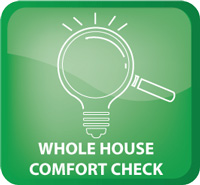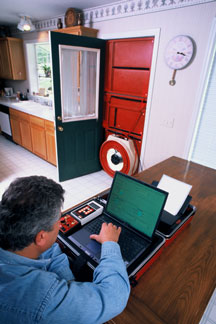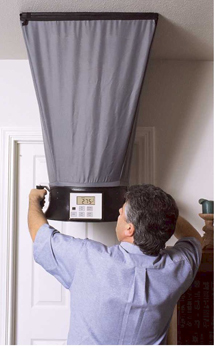A Thorough Evaluation Of All Your Home's Comfort Systems
 Buying A New Comfort System? As recommended by DOE and EPA, before buying a new indoor comfort system, you should ask your heating and cooling contractor for diagnostic testing and computerized equipment sizing calculations.
Buying A New Comfort System? As recommended by DOE and EPA, before buying a new indoor comfort system, you should ask your heating and cooling contractor for diagnostic testing and computerized equipment sizing calculations.
Do You Have Hot or Cold Spots? A Whole House Comfort Checkup will get to the bottom of why, and what you can do about it.
Do Family Members Suffer From Allergies or Asthma? Your home may be contributing to your suffering. A Whole House Comfort Checkup will help identify ways to make your home healthier and safer.
Is Your Indoor Air Too Dry or Too Humid? Improper humidity control can cause static shocks, dry skin and bloody noses in the winter and mold, mildew and structural damage in the summer. A Whole House Comfort Checkup will identify ways to help you control the humidity in your home.
Are Your Utility Bills Too High? According to the Department of Energy, the typical home wastes 25% to 40% of the energy put out by the central furnace, heat pump or air conditioner. Are you throwing away 25¢ to 40¢ out of every utility dollar? Find out if you are and how to stop
Here's How A Whole House Comfort Checkup Works
A specially-trained Comfort and Indoor Air Quality Consultant will visit your home and - using advanced diagnostic instruments and testing procedures - will identify problems that affect your indoor living environment. Your consultant will then provide you with a personalized plan to solve these problems, permanently.
Initial Consultation
Your checkup starts with an initial interview with a Comfort and Indoor Air Quality Consultant. Your input provides valuable information, such as whether any rooms feel clammy when the air conditioner is running, or if any parts of the house need to be dusted more often than others. We encourage all the adults in your home to participate in this initial consultation since everyone's perception of comfort and indoor air quality is unique.
Equipment Inspection
The inspection begins with your heating and cooling equipment. Is it efficient, dependable and safe? Your consultant will visually inspect your equipment for any signs of deterioration, improper installation, or insufficient maintenance. He or she will let you know the average life span of your type of equipment. Your consultant will also evaluate your system's air filtration and purification efficiency, to determine if improvements would better clean your indoor air.
 Insulation Inspection
Insulation Inspection
Even the best heating and cooling system will have trouble keeping you comfortable or will cost more to run if you don’t have enough insulation. Your consultant will visually inspect insulation levels throughout your home and determine if they meet currently recommended levels. More importantly, he or she will look for hidden defects, such as hollow wall cavities, that allow air and heat to bypass your insulation. Attic ventilation levels will also be checked.
Read more: How long does attic insulation last?
Infiltrometer™ Blower Door Test
All houses should have some air leakage but most leak too much. Symptoms of excessive leakage include uneven temperatures throughout the house, wasted energy, excessive dust, cold drafts, dry air in winter, and clammy air in summer. On the other hand, some homes are too airtight and may have unhealthy indoor air.
To measure a home’s air tightness, Department of Energy scientists at Princeton University invented the blower door instrument. It is often featured in magazines and on television, including National Geographic, Better Homes and Gardens, Popular Science, and This Old House.
Using an Infiltrometer™ (a computerized blower door system) your Comfort & Indoor Air Quality Consultant will evaluate how leaky or airtight your entire home is, and where improvements can be made.
Air Leakage Evaluation
Not all air leaks are created equal. From an air quality standpoint, those around your windows and doors are good leaks, since they let in fresh outdoor air. Bad leaks let in dusty, moldy or polluted air from your attic, garage, or crawl space. Leaky air ducts often bring in dirty air, and cause your heating and cooling equipment to perform well below peak efficiency. As part of the Infiltrometer™ blower door test, your consultant will pinpoint where your home’s worst air leaks are, and where improvements can be made.
 Air Flow Diagnosis
Air Flow Diagnosis
If your air duct system has hidden design flaws or blockages, your air flow will be restricted or unevenly distributed. This wastes your money and can make your home uncomfortable. Studies conducted for electric utilities nationwide show that over 66% of heat pumps and air conditioners suffer from this problem. Your consultant will conduct 'static pressure' tests - like a blood pressure check for your ducts - to reveal any hidden blockages or design problems.
Electronic Air Flow Capture Hood Test
Do you have rooms that are hard to heat or cool? There are economical solutions. Your consultant will use an air flow capture hood to measure precisely how much conditioned air is getting to those rooms (provided the supply vents are accessible). If air flow is low, the causes will be determined, and appropriate solutions will be prescribed.
Personalized Improvement Plan
Once the inspection and testing are complete, your consultant will explain the results, and give you a prioritized plan of recommended improvements. Many - such as adding insulation or weather-stripping - can be performed by homeowners as weekend projects. Other improvements may require professionals. Upon request, your consultant will prepare a proposal for repairs your CI Member Contractor can perform, and can recommend other contractors for services they do not offer.
 During your Whole House Comfort Checkup, you will learn how to:
During your Whole House Comfort Checkup, you will learn how to:
-
Achieve even, comfortable temperatures throughout your home
-
Maintain healthy, comfortable humidity levels year-round
-
Reduce dust, system noise and repair bills
-
Save money on your utility bills (typically between 10% and 50%)